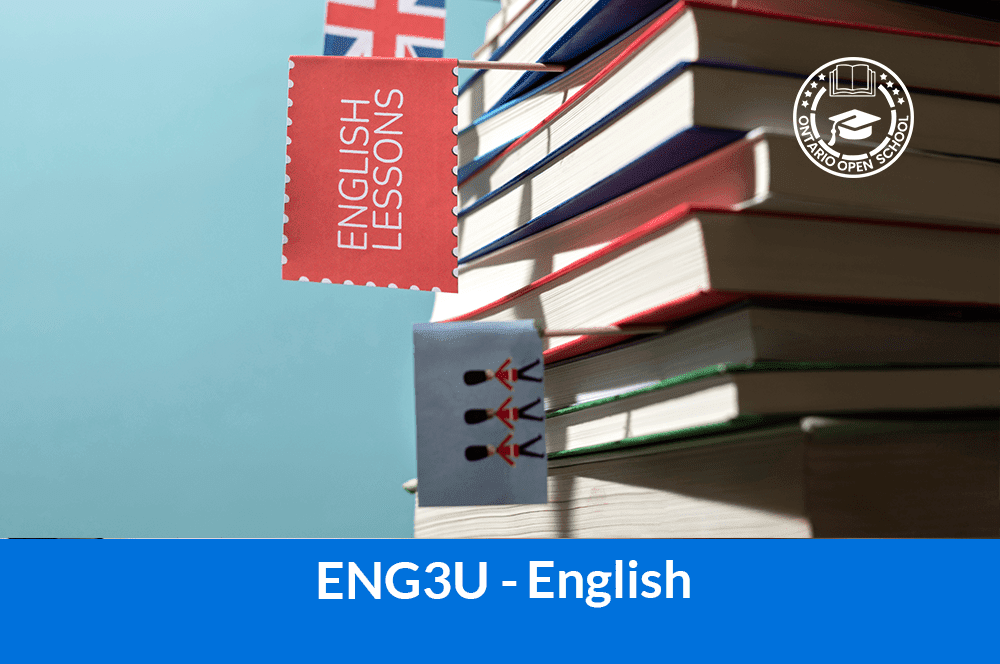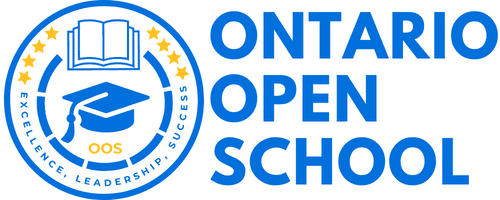- info@ontarioopenschool.com
- 647-494-4499
-
Unit 100 - 29 Gervais Drive, North York, ON.
M3C 1Y9
Copyright 2024 Ontario Open School Inc. All Rights Reserved.
This course emphasizes the development of literacy, communication, and critical and creative thinking skills necessary for success in academic and daily life. Students will analyze challenging literary texts from various periods, countries, and cultures, as well as a range of informational and graphic texts, and create oral, written, and media texts in a variety of forms. An important focus will be on using language with precision and clarity and incorporating stylistic devices appropriately and effectively. The course is intended to prepare students for the compulsory Grade 12 university or college preparation course.
Unit Order | Unit Name | Suggested Time |
|---|---|---|
| Unit 1 | Short Stories and Writing Development (Units covered: A, B, C) Students will explore the literary genre of short stories and the elements of literature; plot, setting, character, conflict, and theme. Students will study the works of various authors and learn to analyze and compare themes that appear in each short story. Students also explore the different types of writing and their characteristics; expository, descriptive, narrative, persuasive, and creative. | 23 hours |
| Unit 2 | Novel Study: Romeo and Juliet (A, B, C) Students will extend their understanding of human nature and the nature of tragedy through the study of Romeo and Juliet. Students will focus on the elements of imagery, language constructs and analysis. They will apply their understanding to the characters’ motivations, actions, and consequences. Students will also analyze Shakespearean English and the various literary devices used in the play. Students interpret themes of love, jealousy, and prejudice while drawing from their own experiences and previous learning. | 27 hours |
| Unit 3 | Poetry (A, B, C) Students will study various types of poetic devices, as well as the oeuvre of various poets. Students draw upon their knowledge and experience of literary analysis from previous units to examine themes, symbols, and motifs in poetry and learn to relate it to their personal experience and understanding. | 23 hours |
| Unit 4 | Media studies (A, B, C, D) Students will create a variety of media texts for different purposes and audiences, using appropriate forms, conventions, and techniques. Students examine films and advertisements throughout the 20th century and analyze the impact they had on society and culture. Students study the correlation between literary and cinematic works and learn to apply various writing and presentation techniques to communicate their learning and understanding. | 27 hours |
| Final Evaluation 30% | Final Project Final Exam | 8 hours 2 hours |
| Total | 110 Hours |
A wide variety of instructional strategies are used to provide learning opportunities to accommodate a variety of learning styles, interests and ability levels. These strategies include, but are not limited to:
Purpose
The primary purpose of assessment is to improve student learning. Assessment relates directly to the expectations for the course.
A variety of assessments for and as learning are conducted on a regular basis to allow ample opportunities for students to improve and ultimately demonstrate their full range of learning and for the teacher to gather information to provide feedback. Assessment tasks relate to the success criteria set out in lesson plans. Success criteria allow students to see what quality looks like.
Evaluation is the process of judging the quality of student work in relation to the achievement chart categories and criteria and assigning a percentage grade to represent that quality. Evaluation is based on gathering evidence of student achievement through:
Assessment for Learning – we provide feedback and coaching. Assessment FOR Learning is the process of seeking and interpreting evidence for the use of learners and their teachers to decide where the learners are in their learning, where they need to go, and how best to go there.
Assessment as Learning – we help students monitor progress, set goals, reflect on their learning
Assessment AS Learning is the process of the explicit fostering of students’ capacity over time to be their own best assessors, but teachers need to start by presenting and modeling external, structured opportunities for students to assess themselves.
Assessment of Learning – we use assessments to provide evaluative statements about student achievement. Assessment OF Learning is the assessment that becomes public and results in statements of symbols
(marks/grades/levels of achievement) about how well students are learning. It often contributes to pivotal decisions that will affect students’ future.
ASSESSMENT TOOLS
Strategies for Assessment and Evaluation of Student Performance
| Units | Duration | Overall Expectations | AFL | AAL | AOL | K
25% |
A
25% |
C
25% |
T 25% |
||
|
70% |
A | 25 hours | A1-A3 | Worksheets
Discussion Reading Responses |
Peer Assessment
Discussion Forum Self-Assessment |
Creating a Short Story | √ | √ | √ | √ | |
| B | 30 hours | B1-B4 | Worksheets
Discussion Reading Responses |
Questionnaire
Discussion Forum Self-Assessment |
Twitter Assignment
Soliloquy Assignment |
√ | √ | √ | √ | ||
| C | 30 hours | C1-C4 | Worksheet
Class Discussion |
Learning Log |
Poetry Analysis |
√ | √ | √ | √ | ||
| D | 25 hours | D1-D4 | Worksheets
Videos
|
Reflective Discussion
Self-Assessment |
Analysis of an Ad | √ | √ | √ | √ | ||
| 30% | A1-D4 | and Final Exam 30% (Written Component) |
√ |
√ |
√ |
√
|
|||||
Resources
http://www.edu.gov.on.ca/eng/policyfunding/growSuccess.pdf
Grading
Weighting of categories
| Knowledge/Understanding | Thinking/Inquiry | Communication | Application |
| 25% | 25% | 25% | 25% |

Course Grade | Grade 11 |
|---|---|
Course Code | ENG3U |
Course Category | English |
Course Type | Academic |
Course Delivery | Online |
Course Duration | 8hrs |
Course Credit | 0 |
Copyright 2024 Ontario Open School Inc. All Rights Reserved.
